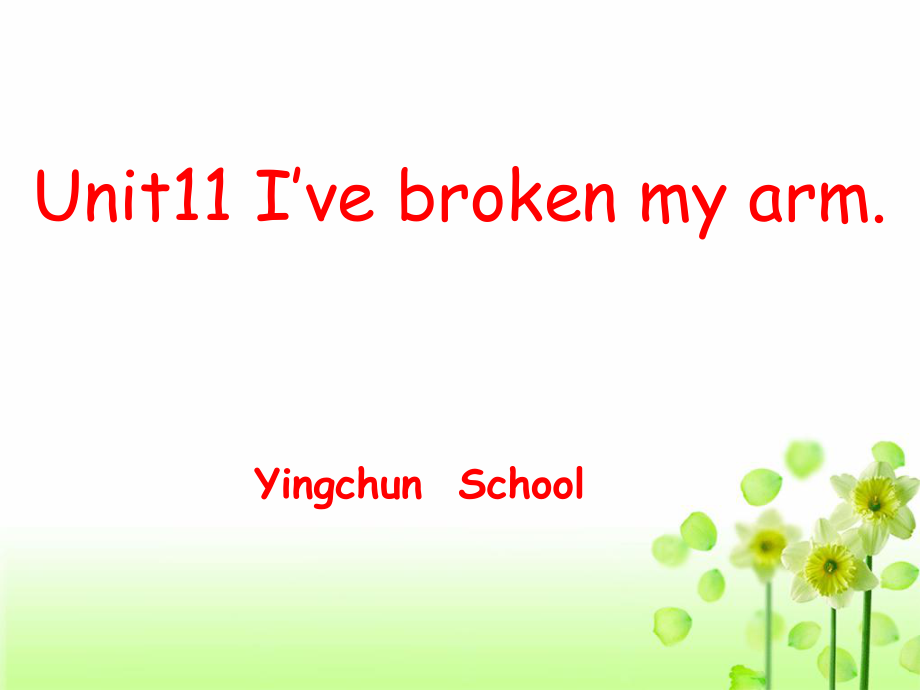《九年級(jí)英語(yǔ)上:Unit 11 I’ve broken my arm課件(魯教版)》由會(huì)員分享����,可在線閱讀�,更多相關(guān)《九年級(jí)英語(yǔ)上:Unit 11 I’ve broken my arm課件(魯教版)(32頁(yè)珍藏版)》請(qǐng)?jiān)谘b配圖網(wǎng)上搜索。
1��、Unit11 Ive broken my arm.Yingchun School一教學(xué)目標(biāo)一教學(xué)目標(biāo)1.學(xué)會(huì)談?wù)撌鹿蕟?wèn)題���;學(xué)會(huì)談?wù)撌鹿蕟?wèn)題����;2.學(xué)會(huì)談?wù)摻】祮?wèn)題學(xué)會(huì)談?wù)摻】祮?wèn)題三語(yǔ)言結(jié)構(gòu)及功能三語(yǔ)言結(jié)構(gòu)及功能1.What have you done to your arm?2.Ive broken my arm. 3.Whats the matter?4.I have an allery. Ive had it since I was six.二情感目標(biāo)二情感目標(biāo)提高學(xué)生的安全意識(shí)�,掌握自護(hù)自救技能。提高學(xué)生的安全意識(shí)��,掌握自護(hù)自救技能��。四四重難點(diǎn)重難點(diǎn)1能熟練應(yīng)用詢問(wèn)發(fā)生意外及回答的句型�。能
2、熟練應(yīng)用詢問(wèn)發(fā)生意外及回答的句型��。2本單元出現(xiàn)的常用詞語(yǔ),如:本單元出現(xiàn)的常用詞語(yǔ)�,如:ambulance,pain,faint,choke以及以及all the time, clean up等。等����。3現(xiàn)在完成時(shí)以及一般過(guò)去的被動(dòng)語(yǔ)態(tài)的用法。現(xiàn)在完成時(shí)以及一般過(guò)去的被動(dòng)語(yǔ)態(tài)的用法�。4了解各事故的處理順序,提高學(xué)生處理事故的能力�����。了解各事故的處理順序�����,提高學(xué)生處理事故的能力�����。Learn Words broken injury bandageallergy foreheadsunburned bitten attackouch eyesight clinic short-term long-ter
3�����、m first aidPerson ReasonHow it happenedKevinhas hurt her kneewas hit by a ballSarahhas cut his foreheadwas outside too longMariahas broken his armfell downTomis sunburnedfell off his bikeListen. Draw lines to match.listeningWhat_ has burned herself_ was bitten by a dog_ has cut himself_ cant see the
4、 blackboard_ has allergy attacksWhena.just nowb.yesterdayc. last nightd.two days agoe. all the timedcabePairworkA: Whats the matter?B: Ive hurt my arm.A: How did you do that?B: I fell off my bike this morning. Put the words or phrases into the correct space as you read. A) allergies B) hurt C) in or
5��、der to D) has had E) weight F) had G) themselves H) accidentsCHDBGEAFRead the statements and check “True” or “False” according to the reading.1.Accidents are very common and nearly everyone has had at least one. ( )2.3% of the serious accidents happen during P.E. lessons. ( )3. 40% of the health pro
6�����、blems are skin and weight problems. ( )4. 15% of the students have never had an accident. ( )5.Westwood Junior High has a very good safety and health record. ( )TFTTTHave you everStudent1Student2Student3 burned yourself?cut yourself badly?broken an arm or leg?Add two more questions:_InterviewIntervi
7�、ew three of your classmates. Complete the chart below.The Present Perfect Tense1.構(gòu)成:have / has +pp.2.用法:1)表示過(guò)去的動(dòng)作對(duì)現(xiàn)在造成的影響或結(jié)果。 I have had dinner. He has gone to Shanghai.2)表示動(dòng)作發(fā)生在過(guò)去���,持續(xù)到現(xiàn)在,也許還要持續(xù)下去��。 We have lived here since 1998. My brother has been a soldier for three years. 3.時(shí)間狀語(yǔ) for two years , si
8�����、nce , just , already, yet , in the past ten years , ever, never The Present Perfect Tense 非延續(xù)性動(dòng)詞非延續(xù)性動(dòng)詞 相應(yīng)的延續(xù)性動(dòng)詞相應(yīng)的延續(xù)性動(dòng)詞 buy have die be dead arrive, come be go, leave, move be away, be out of begin, start be on put on be on fall asleep (ill) be asleep (ill ) finish, end be over go to know know join
9���、be in, be a +n. The Present Perfect Tense1.改寫(xiě)句子�。改寫(xiě)句子��。 1)He has eaten two peaches. (用用 last night改改寫(xiě)寫(xiě)) He _ two peaches last night. 2) He bought the bike two years ago. (for two years ) He _ _ the bike for two years. 3) She died ten years ago .( since ten years ago ) She _ _ _ since ten years ago. 翻譯
10�����、下列句子翻譯下列句子 1)他出國(guó)兩年了。)他出國(guó)兩年了�����。 2)這小孩睡了)這小孩睡了10個(gè)小時(shí)了�����。個(gè)小時(shí)了�����。 3)這本書(shū)你買了多長(zhǎng)時(shí)間���。)這本書(shū)你買了多長(zhǎng)時(shí)間�。 4)昨天九點(diǎn)開(kāi)始下雪�����。)昨天九點(diǎn)開(kāi)始下雪�。Homework:Writing假如你是李明,請(qǐng)根據(jù)內(nèi)容提示給王老師寫(xiě)一個(gè)請(qǐng)假條����。內(nèi)容提示:昨天你患了重感冒�,咳嗽發(fā)燒�����,醫(yī)生建議你臥床休息兩天�����,吃些藥�。雖然今天感覺(jué)好些了,但恐怕今明兩天仍不能到校��。Learn WordsambulanceX-raytreatmentfaintnosebleedchokepeanutsafelyfishboneimmediately應(yīng)急技巧應(yīng)急技巧When th
11����、ese accidents happen, what do you need to do?Put the treatments in order._put a bandage on it._Run it under water.21_ Call for an ambulance._ Have an X-ray.12_ Clean it._ Put your head back.21Read the passage fast and answer the following questions.1. What did the nurse give to Xie Gang?2. What happ
12��、ened before Wang Miaos mother was called?3. What did Jia Ming do after the fishbone was removed?4.What treatment did Han Xue get just before a bandage was put on her arm?The nurse cleaned his knee ,and then put medicine on it.Wang Miao choked on a peanut.He was allowed to go home.She had an X-ray.Te
13�、ll your stories 講述自己的故事講述自己的故事Write about an accident that has happened to you. Say how it happened and the treatment you received. Use the following words to help you.first then next after that before laterHomework:書(shū)面表達(dá)書(shū)面表達(dá)昨天一名老人摔傷了,傷勢(shì)很嚴(yán)重���,昨天一名老人摔傷了����,傷勢(shì)很嚴(yán)重,假如你是一名醫(yī)生�,你接診了這位病假如你是一名醫(yī)生,你接診了這位病人�,請(qǐng)描述以下你是怎樣治
14、療這位病人��,請(qǐng)描述以下你是怎樣治療這位病人的����。人的。Learn WordsstitchUtahtraprockpocketknifebleedingmountainsideadventureravalanchesurviveAccidents can sometimes happen more when we do sports.Write the letter of each sport next to each accident that can happen.A: soccer B: climbing C: swimming_ We can fall down._ We can have
15���、 breathing problems._ We can get sunburned._ We can break bones._ We can freeze._ We can cut ourselves.ABBC經(jīng)驗(yàn)之談經(jīng)驗(yàn)之談ABBBABRead the passage fast and answer the following questions.1. Where and when did Aron lose his arm?2. What happened to Aron on that April day?3. Why did he cut off his arm?4.Whats t
16����、he name of his book?He lost his arm in Utah in April 2003.His arm became trapped under a 2,000-kilo rock .In order to save his own life.Between a Rock and a Hard Place.Read the statements and circle“True”, “False” or “Dont know”.1.Aron has nearly died three times. 2. Aron had a serious accident in A
17�����、pril 2003.3. Aron ran out of water ofter three days.4. Aron wrote his book before his accident.5.Aron still goes mountain climbing.Dont knowTrueFalseFalseDont knowDiscussion1.Do you think everyone has the will to survive in a dangerous situation?2.Is it possible to save yourself in any situation?3.Can a bad accident change your life?4.Is it important to think positively after you have been badly hurt?Homework:Many earthquakes happen in China, so its important to know what to do when one hit. Write about your ideas.
 九年級(jí)英語(yǔ)上:Unit 11 I’ve broken my arm課件(魯教版)
九年級(jí)英語(yǔ)上:Unit 11 I’ve broken my arm課件(魯教版)

